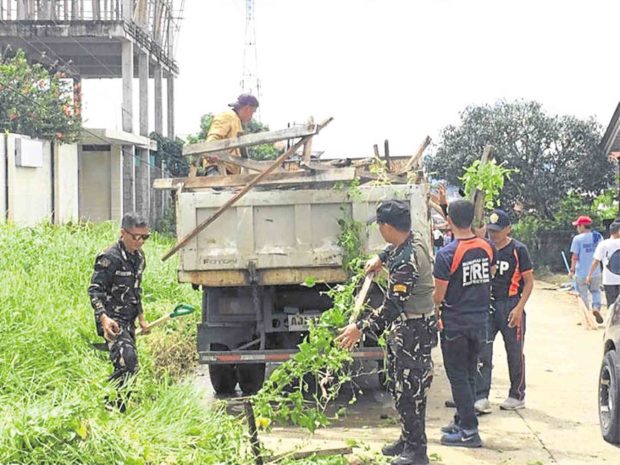
Heavy equipment from the Mandaue City government is used to clear a waterway where trash, dirty water and household wastes are thrown. —TONEE DESPOJO/CEBU DAILY NEWS
CITY OF SAN FERNANDO—Highly urbanized cities outside Metro Manila have yet to implement the National Sewerage and Septage Management Program (NSSMP) in their respective areas, leaving unused a P650-million allotment in the care of the Department of Public Works and Highways (DPWH).
The budget, set aside as a subsidy, has not been used “due to no applicants,” according to a report sent by the DPWH environmental and social safeguards division to Sen. Loren Legarda, chair of the Senate finance committee and former chair of the Senate environment committee.
The Clean Water Act of 2004 (Republic Act No. 9275) tasked the DPWH to prepare and enforce the NSSMP. Seventeen cities alone would need P26.3 billion to undertake sewerage and septage projects.
The project intended that all local governments would have developed septage management systems and 17 highly urbanized cities would have built sewerage systems by 2020.
That would have given 43.6 million Filipinos access to septage treatment facilities and 3.2 million Filipinos to be served by sewage treatment plants three years from now.
According to a DPWH study, the country has invested very little in proper sewage collection and treatment.
“More than 20 million Filipinos do not have access to improved sanitation; many who have toilets do not have septic tanks; many septic tanks have open bottoms; and most septic tanks are not regularly desludged. Moreover, when septage is removed from septic tanks, it is often not properly treated,” it said.
“The effects of this neglect include economic losses exceeding P78 billion per year, 55 deaths per day, and damage to ecosystems and biodiversity,” it added.
According to the DPWH, highly urbanized cities are hesitant to apply for the subsidy because of the high cost of constructing sewerage systems.
These cities are also hobbled by the lack of political will, the slow passage of pertinent local ordinances, conflicts between local governments and water districts, and a lack of funding for feasibility studies, the DPWH said.
To help these cities, the DPWH got the nod of the National Economic and Development Authority (Neda) on June 27 to increase the national government’s sewerage project subsidy to 50 percent and to also include a 50 percent subsidy for septage projects.
The Neda also allowed other cities and first-class towns to avail themselves of funding support.
Zamboanga City has refiled its application for subsidy while the cities of Cagayan de Oro and Butuan have been selected as pilot areas.
The Duterte administration has bid out consultancy services for the formulation of the Philippine water supply and sanitation master plan, which may further delay the NSSMP.